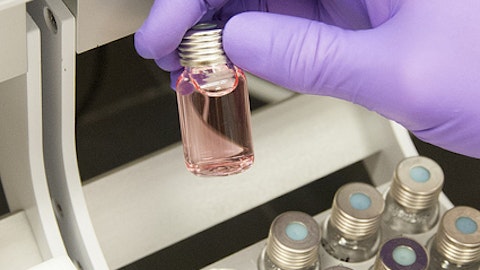Chances are that some people have not heard of Michael Castor or his healthcare-focused hedge fund Sio Capital. Mr. Castor started Sio Capital in 2006 after working for five years at Bernstein Investment Research and Management. Prior to that, he worked in the investment banking/equity capital markets division of JP Morgan. He holds an MD from Ohio State University College of Medicine and before entering the field of finance in mid 2000 used to be a surgeon. Since its inception in 2006 and till 2013, Sio Capital generated an average annual return of 10.4% versus the S&P 500 Total Return Index’s return of 3.8%. The surprising thing behind that outperformance was that it was generated while remaining nearly market neutral with a portfolio beta of only 0.15. The fund continued with that outperformance in 2014 by generating over 20% in returns.
We at Insider Monkey consistently track Sio Capital’s portfolio because several of the fund’s stock picks have become multibaggers in the past and the fund continues to outperform most of its peers without taking any undue risks. According to Sio Capital’s last submitted 13F filing, its US equity portfolio at the end of September was worth $145.9 million, almost 28% lower than the $202.4 million it was worth at the end of June. The filing also revealed that during the third quarter the Sio Capital’s portfolio saw a very high turnover of 73.53%. In this article we will be looking at the performance of Sio Capital’s top five equity holdings – which in aggregate accounted for 36.7% of the value of the fund’s equity portfolio at the end of September- during the final quarter of 2015 and analyze whether the fund made the right decision by betting on them.
Follow Michael Castor's Sio Capital
An everyday investor does not have the time or the required skill-set to carry out an in-depth analysis of equities and identify companies with the best future prospects like a hedge fund can. However, it is also not a good idea to pay the egregiously high fees that investment firms charge for their stock picking expertise. Thus a retail investor is better off to monkey the most popular stock picks among hedge funds by him or herself. But not just any picks mind you. Our research has shown that a portfolio based on hedge funds’ top stock picks (which are invariably comprised entirely of large-cap companies) falls considerably short of a portfolio based on their best small-cap stock picks. The most popular large-cap stocks among hedge funds underperformed the market by an average of seven basis points per month in our back tests, whereas the 15 most popular small-cap stock picks among hedge funds outperformed the market by nearly a percentage point per month over the same period between 1999 and 2012 (read the details here).
#5 Cardinal Health Inc (NYSE:CAH)
– Shares Owned by Sio Capital (as of September 30): 94,868
– Value of Holding (as of September 30): $7.29 million
Although shares of Cardinal Health Inc (NYSE:CAH) mostly remained in the $80-$90 range throughout 2015, starting the fourth quarter relatively low helped them to end the three-month period with gains of 16%. Cardinal Health Inc (NYSE:CAH) has been among Sio Capital’s favorite stock picks since 2013. Most of the gains the stock made during the fourth quarter came before the company declared its fiscal 2016 first quarter results on November 2. Since Cardinal Health beat analysts’ expectations of EPS of $1.10 on revenue of $27.19 billion by reporting EPS of $1.38 on revenue of $28.10 billion, its stock managed to sustain those gains.
The acquisition-driven growth strategy that Cardinal Health has followed seems to be working wonderfully for the firm as it has managed to beat analysts’ expectations for several quarters in a row. On December 21, the company announced that its naviHealth subsidiary has completed the acquisition of RightCare Solutions, although it didn’t disclose the financial terms of the deal. This announcement came just two months after the company had reported the completion of its acquisition of Johnson & Johnson’s Cordis business unit for $1.944 billion. Billionaire Jim Simons‘ Renaissance Technologies was one of the hedge funds that initiated a stake in Cardinal Health during the third quarter; it purchased 685,700 shares of the company.
Follow Cardinal Health Inc (NYSE:CAH)
Follow Cardinal Health Inc (NYSE:CAH)
Receive real-time insider trading and news alerts
#4 Medtronic PLC (NYSE:MDT)
– Shares Owned by Sio Capital (as of September 30): 113,289
– Value of Holding (as of September 30): $7.58 million
Shares of the medical technology company Medtronic PLC (NYSE:MDT) had a decent run, having gained nearly 15% during the final quarter of 2015, which helped the stock to end the year up by 6.5%. Sio Capital more than doubled its stake in the company during the third quarter. However, among the investors covered by Insider Monkey, the number of funds with long positions declined by five to 58 during the same period. Doug Silverman and Alexander Klabin‘s Senator Investment Group increased its stake in the company by 25% to 5 million shares during the third quarter and beacme its largest shareholder at the end of that period.
On December 2, Medtronic PLC (NYSE:MDT) reported its fiscal 2016 second quarter results, declaring EPS of $1.03 on revenue of $7.10 billion, compared to EPS of $0.96 on revenue of $4.40 billion posted a year earlier. Last year the company hiked its quarterly dividend to $0.38 from $0.305, which gives the stock a dividend yield of 2.06%.
Follow Medtronic Plc (NYSE:MDT)
Follow Medtronic Plc (NYSE:MDT)
Receive real-time insider trading and news alerts
#3 Johnson & Johnson (NYSE:JNJ)
– Shares Owned by Sio Capital (as of September 30): 85,438
– Value of Holding (as of September 30): $7.98 million
Owing mostly to the strong third quarter results (minus the currency headwinds) the company reported on October 13, shares of Johnson & Johnson (NYSE:JNJ) ended fourth quarter up by 10%. Interestingly, while the ownership of the company among funds covered by us decreased by four to 74 during the third quarter, its ownership among billionaire investors covered by us increased by two to 12 during the same period.
Most big healthcare companies are relying on M&A to boost their growth, but Johnson & Johnson (NYSE:JNJ) has been reluctant to do big M&A deals and it seems it will avoid them in the foreseeable future too. Speaking at JP Morgan Healthcare Conference in San Francisco earlier this month Johnson & Johnson’s CEO, Alex Gorsky, revealed that the company is more interested in doing smaller, value-boosting deals that can help it to lay its hands on early-stage drug candidates. After trading above the $100 mark for over two months, shares of the company have broken below it recently. This moved has pushed Johnson & Johnson’s annual dividend yield to over 3%.
On January 26, Johnson & Johnson reported its financial results for the last quarter of 2015. It delivered EPS of $1.15 on revenue of $17.81 billion, compared to $0.89 and $18.25 billion a year earlier. The results also missed the top and bottom-line estimates of $17.88 billion and $1.42, respectively. One of the main reasons for the decline in sales were currency headwinds, which the company expects to have a smaller effect this year.
With ownership of nearly 10.69 million shares of the company Ken Fisher’s Fisher Asset Management continued to remain its largest shareholder at the end of September among the funds covered by us.
Follow Johnson & Johnson (NYSE:JNJ)
Follow Johnson & Johnson (NYSE:JNJ)
Receive real-time insider trading and news alerts
#2 Neos Therapeutics Inc (NASDAQ:NEOS)
– Shares Owned by Sio Capital (as of September 30): 666,729
– Value of Holding (as of September 30): $14 million
Neos Therapeutics Inc (NASDAQ:NEOS) was a new position in Sio Capital’s equity portfolio at the end of the third quarter. With its shares falling by over 30%, it was also the worst performer among Sio Capital’s top five equity holdings during the last three months of 2015. Neos Therapeutics Inc (NASDAQ:NEOS) manufactures and commercializes products for the treatment of attention deficit hyperactivity disorder (ADHD). It made its debut on NASDAQ in July last year and since then its shares have fallen by nearly 50% since the IPO.
Neos’ stock took a hit in October, when the US Food and Drug Administration said that it would not approve the company’s methylphenidate Orally Disintegrating Tablet (ODT) on November 9 (the target approval date). The FDA issued a complete response letter asking the company to conduct a bridging study to provide more details about the to-be-marketed product. Nevertheless, Neos still plans to launch the drug in 2017.
“Ultimately, we think that the delay for methylphenidate ODT has only a small impact in our expected valuation of NEOS. This remains a high conviction holding,” Michael Castor said in his third-quarter letter to investors.
Jason Karp‘s Tourbillon Capital Partners trailed Sio Capital as the company’s largest shareholder among the funds covered by us at the end of the third quarter; it held 611,686 shares of Neos Therapeutics.
Follow Neos Therapeutics Inc. (NASDAQ:NEOS)
Follow Neos Therapeutics Inc. (NASDAQ:NEOS)
Receive real-time insider trading and news alerts
#1 Quotient Ltd (NASDAQ:QTNT)
– Shares Owned by Sio Capital (as of September 30): 1.58 million
– Value of Holding (as of September 30): $16.67 million
The conviction that Sio Capital displayed in Quotient Ltd (NASDAQ:QTNT) by increasing its stake in the commercial-stage diagnostics company by 45% during the third quarter – when its stock fell 12% – paid off handsomely during the fourth quarter. On December 3, shares of the company spiked after it announced that it had entered into a design and build contract with MW High Tech Projects UK Limited for the construction of a new product development and manufacturing facility. The stock sustained most of the gains and ended the fourth quarter up by 23%.
Quotient Ltd (NASDAQ:QTNT) is expected to report its fourth quarter earnings early next month. The Street estimates a loss of $0.76 per share on revenue of $4.03 million. During the third quarter, the ownership of the company among the funds covered by us increased by two to nine. Bihua Chen‘s Cormorant Asset Management was one of the funds that initiated a stake in Quotient during the third quarter; it purchased 500,000 shares of the company.
Follow Quotient Ltd (NASDAQ:QTNTQ)
Follow Quotient Ltd (NASDAQ:QTNTQ)
Receive real-time insider trading and news alerts
Disclosure: None




